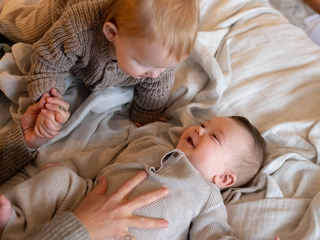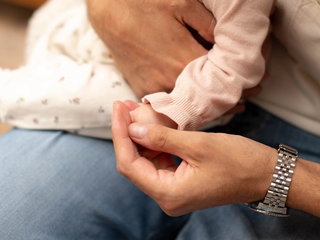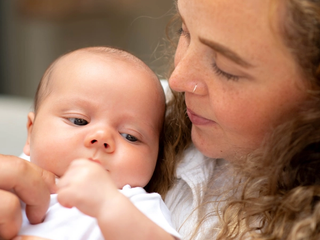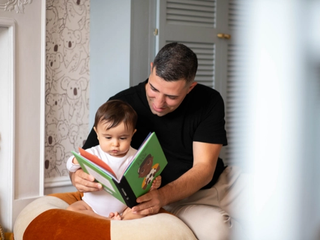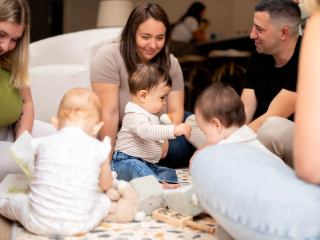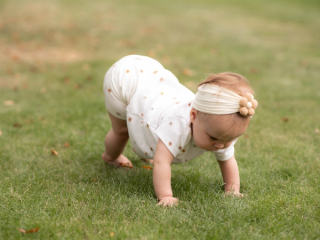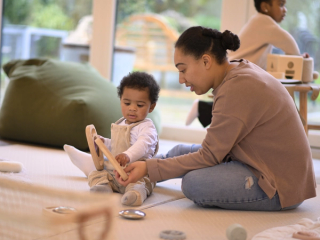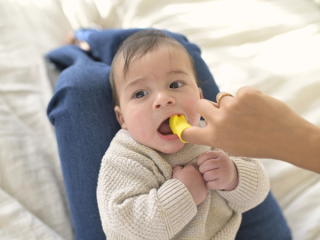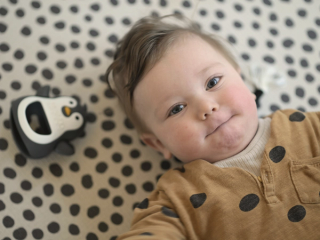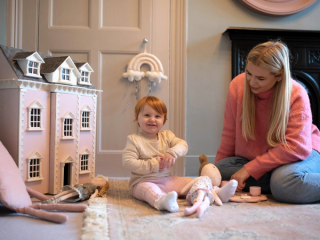
- Home
- Advice Hub
- Baby
- Bonding & Development
- What Should My Baby Learn And How Can I Help?
What should my baby be learning and how can I help them?
Our Learning & Play Expert Ruth, shares the key developmental milestones for different ages and what you can do at home to help your baby.
When it comes to child development, Dr Mary Sheridan’s developmental milestones are considered the best thing to look at. Dr Sheridan’s work was mainly done during the 70s and although the world around children has changed dramatically, development really hasn’t. There are four developmental domains (motor skills, speech and language, social and emotional skills and cognitive skills) and, within this, universally recognised developmental milestones that identify when a child of typical development should be achieving each milestone.
Below is a summary of key developmental milestones, as identified by Dr Mary Sheridan, from 3 months:
3 months
- Responsive vocalisation
- Visual following of a face or toy in a semi circle
- Visual hand regard in middle
- Head control in supported sitting
6 months
- Becoming shy and anxious with strangers
- Makes monosyllabic babble sounds
- Reaches out with one hand to grasp, passes objects from hand to hand
- Begins to search for a dropped toy within the visual field
- Weight-bearing on supported standing
- Rolls from front to back
- Primitive reflexes have diminished and protective reflexes begin to appear
9 months
- Plays social games, e.g. peekaboo and pat-a-cake
- Babbles tunefully and communicatively
- Shows stranger wariness
- Searches if an objects falls or is hidden in view
- Shows causal understanding
- Uses index finger to explore and grasps small objects with a pincer grasp
- Can pull to stand from sitting
12 months
- Following simple instructions associated with gestures
- Initiates joint attention
- Mature finger grasp
- Walks around furniture, lifting one foot and stepping sideways, independent walking emerges
15 months
- Says the first few words
- Plays functionally with toys and objects
- Mature grasp and release of objects – makes a tower of two cubes
- Walks independently
18 months
- Says a range of single words
- Follows simple situational directions, shows body parts
- Imitates day to day activities at home
- Early symbolic play: use of toys or dolls for enacting familiar actions
- Emerging hand preference
- Awareness of self-identity
As we all know, the period of growth from newborn to 1 year is so fast and, as your baby grows and develops, health visitors and other health professionals will use the developmental domains and milestones to track your child’s development. You may be invited to go in to a clinic where they will ask you a range of questions or observe your child playing to see if they’re on track developmentally.
When it comes to learning, children who are in an early years setting such as a childminder’s or nursery will be accessing what is known as the Early Years Foundation Stage. Within this, professionals plan a curriculum against the seven areas of learning which are statutory. The seven areas of learning are: Communication and Language, Personal, Social and Emotional Development, Physical Development, Literacy, Mathematics, Understanding the World, Expressive Arts and Design.
For parents at home, who may not be familiar with the curriculum expectations, I created my learning through play activity cards to do exactly this – align to the curriculum so you know you are helping your child learn exactly what they need to know at exactly the right time.
Here are some ideas of developmentally appropriate activities and ideas you can do support your baby to learn from birth, taken from the My Mummy Teacher Learning Through Play Activity Cards, focusing on the top 3 most important things: talk, sing and play!
Talk
Narrate what you are doing as you go about your day- to- day life with your baby. People probably think I’m crazy but I do this all the time with my little one because it really is the best way to develop their language skills, both expressive and receptive. For example, yesterday we went swimming together and in the changing room to not only soothe her and entertain her, but to support her development I was continually narrating what I was doing. “Let’s put your arm in here, well done good girl, we need a big stretch to get your leg in your trousers, ooh mummy needs to put our towels here, let’s hang them up together, how many socks have we got? I can see one, two. Two! We’ve got two socks now let’s put them on your little feet.”
Sing
Research has shown that when a child knows eight or more nursery rhymes off by heart at the age of 4 that they are usually one of the best at reading and spelling in their class by the age of 8. You can start singing to your baby when they are even in the womb! It helps them to recognise your voice, feel that connection and support their cognitive development. Whilst singing, why not do some actions too as suggested below:
Play
The key thing here is to get down on their level, give eye contact and just have fun! Here’s an activity to give a go:
Newborn +
Lie your baby on a sensory foil blanket, scrunched up newspaper or wrapping paper and let them hear the noises as they kick.
Challenging
Include other materials such as bubble wrap, cardboard and artificial grass.
Easier
Scrunch up materials for your baby to listen to the different sounds
Remember, you don’t have to do any of this alone. Many libraries offer Rhyme Time sessions for free where you can go along and sing with your baby in company. There are also lots of baby clubs and classes offering sensory stimulation for babies, which will give you more ideas for things to try at home. Or, just get a group of friends together for a playdate. Don’t feel pressured to be ‘pushing’ your baby towards each milestone. Even the seemingly boring day-to-day things you do together will help them grow and develop.
Advice & tips

Want to read more? Join the HiPP BabyClub for full access to this article.
As a BabyClub member, you'll get access to a range of exclusive benefits, including:
Monthly competitions
Discounts from our Partners
Expert advice tailored to your little one's age
Weaning recipes
HiPP shop discounts*
*10% off HiPP's online shop does not apply to our First Infant, Anti-Reflux or Comfort Formula Milk.
Important notice: Breastfeeding is best. Follow on milk should only be used as part of a mixed diet from 6 months. Talk to a healthcare professional.




